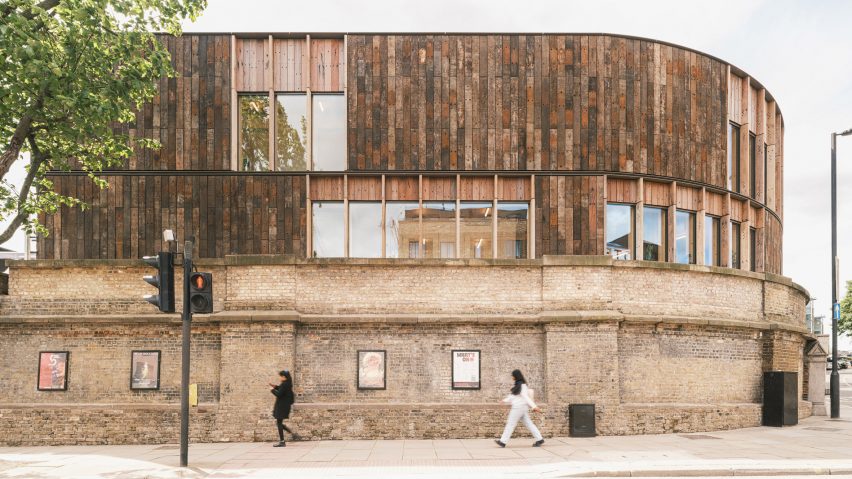Wooden planks made from old railway sleepers clad Roundhouse Works, a creative centre in London designed by architect Paddy Dillon with local studios Reed Watts Architects and Allies & Morrison.
The building is located to the rear of the Roundhouse, a famous concert venue in Camden that is housed in a former railway shed.
It was designed by Dillon, Reed Watts Architects and Allies & Morrison to provide creative facilities for young people, particularly those from underrepresented backgrounds.
The Roundhouse has offered a programme for young people for over 15 years, and the new spaces provided by Roundhouse Works next door will double the capacity of this programme to 15,000 students a year.
"Roundhouse Works comes out of hours of conversations to identify exactly what young people need," said Dillon.
"It's a response to the Roundhouse site, but more importantly, it tries to stay as close as possible to the spirit of the Roundhouse and the people who work there."
The centre provides three studios, including a triple-height space for circus and performance, a multiuse workshop and a podcast room run by the audio platform Transmission Roundhouse.
Alongside them is the Inflexion Workspace, an affordable co-working space for creative entrepreneurs and freelancers.
Referencing the adjacent Roundhouse's original use as a railway shed, Roundhouse Works has been clad in recycled railway sleepers. They bring a weathered, industrial character to its gently curving facade that sits above an existing brick boundary wall.
Protruding from the roof of the curved, wood-clad main building are the forms of the studio spaces, which have been clad with corrugated white metal and emblazoned with the Roundhouse Works name in black lettering.
The centre has a cross-laminated timber (CLT) structure to ensure future flexibility and to help reduce the building's carbon impact. It has been left exposed internally to bring a feeling of lightness to the spaces.
"We've worked hard to significantly reduce the embodied carbon in the building's fabric with the internal timber structure and reclaimed timber railway sleepers on the facades," said Reed Watts Architecture director Matt Watts.
"The result of this is a brilliant resource for Camden's young people that wears its heart on its sleeve and that reflects our shared commitment to future generations as well as the site's long association with the railway behind it."
Nearby, the historic Stables Market landmark became the site of a new bar and restaurant designed by architecture studio vPPR, which is topped by a wavy steel canopy that also reference's the site's industrial heritage.
Elsewhere in Camden, US studio James Corner Field Operations is converting a kilometre-long section of disused railway into "a garden in the sky" named the Camden Highline.
The photography is by Fred Howarth.

